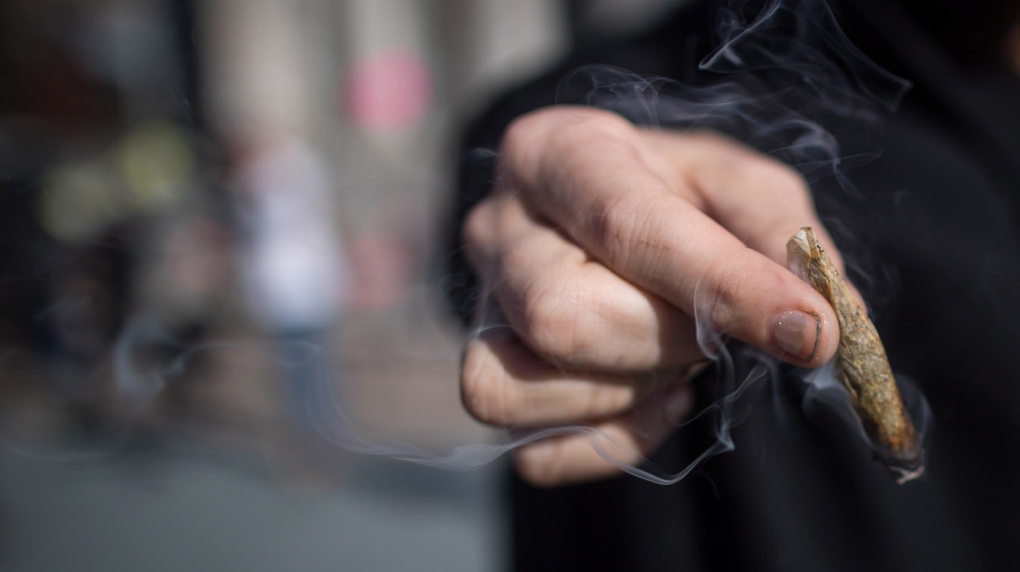Cannabis found in twice as many injured drivers since legalization: B.C. study
 A man holds a joint while smoking marijuana to celebrate the legalization of recreational cannabis, in Vancouver, on Wednesday October 17, 2018. (THE CANADIAN PRESS/Darryl Dyck)
A man holds a joint while smoking marijuana to celebrate the legalization of recreational cannabis, in Vancouver, on Wednesday October 17, 2018. (THE CANADIAN PRESS/Darryl Dyck)
A new study out of the University of British Columbia suggests that cannabis is being detected in twice as many injured drivers since its 2018 legalization.
Dr. Jeffrey Brubacher, an associate professor at UBC and the principal investigator of the study, says before cannabis was legalized, 3.8 per cent of injured drivers had THC concentrations above the Canadian legal driving limit of two nanograms/ml. That percentage rose to 8.6 per cent after cannabis was legalized.
The amount of injured drivers with a THC concentration of above five nanograms/ml in their system also went up, from 1.1 per cent pre-legalization to 3.5 per cent after legalization.
"It's concerning that we're seeing such a dramatic increase," Brubacher says in a news release. "There are serious risks associated with driving after cannabis use. Our findings suggests more is needed to deter this dangerous behaviour in light of legalization."
Brubacher and his colleagues analyzed blood samples from 4,339 "moderately injured" drivers who received treatment at four B.C. trauma centres between 2013 and 2020.
Researchers found that those over the age of 50 made up the largest increase of drivers injured while under the influence of cannabis.
The study, published in the New England Journal of Medicine, also suggests there weren't any significant changes in drivers testing positive for alcohol, on its own, or in combination with THC.
The federal government amended the Criminal Code when cannabis was legalized, which gave police more powers to test drivers who they suspected might be driving under the influence of drugs.
But Brubacher says the findings of the study show that it wasn't enough to deter cannabis impaired driving.
“We hope that policymakers will use our findings to design public information campaigns and enforcement measures that encourage drivers, especially older drivers, to separate cannabis use from driving. At the same time, it is important not to lose sight of alcohol impaired driving, which is extremely high risk, especially when combined with cannabis.”
The study suggests that while cannabis use is often associated with cognitive deficits, the presence of THC in the blood is not always an indicator that a collision was caused by cannabis impairment.
"Detecting cannabis, especially at low concentrations, doesn't necessarily mean a driver is impaired," Brubacher adds. "But the risk is real with higher THC levels, which is why it’s so important that we continue to assess and respond to the impact that legalization is having on road safety.”
Brubacher says his team is now expanding their research efforts to 15 trauma centres across Canada.
They plan to collect more information on the prevalence of cannabis, alcohol and other substances in injured drivers, which they hope could help guide traffic policies both nationally and provincially moving forward.
CTVNews.ca Top Stories

Expert warns of food consumption habits amid rising prices
A new survey by Dalhousie University's Agri-Food Analytics Lab asked Canadians about their food consumption habits amid rising prices.
Documents reveal Ottawa's efforts to get Loblaw, Walmart on board with grocery code
It was evident to the federal government as early as last fall that Loblaw and Walmart might be holdouts to the grocery code of conduct, jeopardizing the project's success.
opinion The special relationship between King Charles and the Princess of Wales
Royal commentator Afua Hagan writes that when King Charles recently admitted Catherine to the Order of the Companions of Honour, it not only made history, but it reinforced the strong bond between the King and his beloved daughter-in-law.
Charlie Woods, son of Tiger, shoots 81 in U.S. Open qualifier
Charlie Woods failed to advance in a U.S. Open local qualifying event Thursday, shooting a 9-over 81 at Legacy Golf & Tennis Club.
Improve balance and build core strength with this exercise
When it comes to cardiovascular fitness, you may tend to focus on activities that move you forward, such as walking, running and cycling.
New Norad commander calls Canada's defence policy update 'very encouraging'
American troops will be spending more time training in the Far North, the new commander of Norad says, a strategy that fits 'hand-in-glove' with Canada's renewed focus on Arctic defence.
B.C. tenants evicted for landlord's use after refusing large rent increase to take over neighbouring suite
Ashley Dickey and her mother rented part of the same Coquitlam duplex in three different decades under three different landlords.
Mountain guide dies after falling into a crevasse in Banff National Park
A man who fell into a crevasse while leading a backcountry ski group deep in the Canadian Rockies has died.
$70M Lotto Max winners kept prize a secret from family for 2 months
During a special winner celebration near their hometown, Doug and Enid shared the story of how they discovered they were holding a Lotto Max ticket worth $70 million and how they kept this huge secret for so long.

































